Just Jihad: July 2006: Archives

On the heels of an errant bombing in Lebanon that is believed to have killed in excess of 50 civilians, Secretary of State Condoleezza Rice has decided to return to Washington without completing the balance of her diplomatic mission. After the bombing, the Lebanese Prime Minister Faud Saniora called for nothing less than an immediate cease fire, a move that signaled little room for further negotiation at the moment. MSNBC has the full story here.
The U.S. official, who spoke on condition of anonymity about the diplomatic situation, said Rice would work from Washington on a U.N. Security Council resolution to end the crisis.
Rice said on Sunday she was “deeply saddened by the terrible loss of innocent life" after an attack on a village in southern Lebanon. But she did not call for an immediate cease-fire in the fighting between Israel and Hezbollah militias.
Israel’s attack, which killed scores of civilians while they sleep, led Rice to cancel an expected visit to Beirut for a meeting Sunday with Lebanese Prime Minister Faud Saniora. Rice said she called Saniora to postpone; angry Lebanese officials said it was their government that called off the meeting.
The bombing mishap is expected to harden calls for a cease fire as well as continue the trend of growing public outrage within the region at the continued actions of the Israeli army. Since the start of the conflict, when Hezbollah provoked Israel by abducting two Israeli soldiers and killing three others, public opinion has shifted from anger at Hezbollah to anger at Israel which has made it more difficult for Israel and the United States to delay efforts to bring the military actions to an end.
Daniel DiRito | July 30, 2006 | 9:05 AM |
link
| Comments (0)


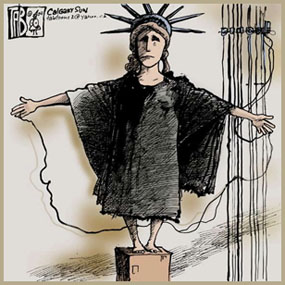
The recent Supreme Court ruling on detainees held by the United States stated that they were to be treated in accord with the Geneva Conventions guidelines and that they were entitled to be processed under current military legal proceedings or some other legitimate legal process that Congress may choose to enact. The Washington Post reports that Attorney General Gonzales, in light of the ruling, is discussing new legislation to shield those who were responsible for the handling of the detainees during the period of time that was the focus of the Supreme Court ruling.
An obscure law approved by a Republican-controlled Congress a decade ago has made the Bush administration nervous that officials and troops involved in handling detainee matters might be accused of committing war crimes, and prosecuted at some point in U.S. courts.
Senior officials have responded by drafting legislation that would grant U.S. personnel involved in the terrorism fight new protections against prosecution for past violations of the War Crimes Act of 1996. That law criminalizes violations of the Geneva Conventions governing conduct in war and threatens the death penalty if U.S.-held detainees die in custody from abusive treatment.
Prior to the passage of the McCain bill establishing guidelines on torture and the proper handling of detainees, the Bush administration repeatedly asserted that the U.S. did not engage in torture. Nonetheless, once the bill was passed, the administration attached a signing statement to the bill that basically exempted the President from the legislation should he determine a situation was a matter of national security. The signing statement along with the Supreme Court ruling has apparently raised concerns that there may be ample evidence to make accusations of war crimes. The larger problem, in my opinion, is the added damage the legislation sought by Gonzales would do to an already dismal view of the United States around the world.
Gonzales told the lawmakers that a shield is needed for actions taken by U.S. personnel under a 2002 presidential order, which the Supreme Court declared illegal, and under Justice Department legal opinions that have been withdrawn under fire, the source said. A spokeswoman for Gonzales, Tasia Scolinos, declined to comment on Gonzales's remarks.
The Justice Department's top legal adviser, Steven G. Bradbury, separately testified two weeks ago that Congress must give new "definition and certainty" to captors' risk of prosecution for coercive interrogations that fall short of outright torture.
Language in the administration's draft, which Bradbury helped prepare in concert with civilian officials at the Defense Department, seeks to protect U.S. personnel by ruling out detainee lawsuits to enforce Geneva protections and by incorporating language making U.S. enforcement of the War Crimes Act subject to U.S. -- not foreign -- understandings of what the Conventions require.
The Supreme Court, in contrast, has repeatedly said that foreign interpretations of international treaties such as the Geneva Conventions should at least be considered by U.S. courts.
The law that concerns Gonzales was sponsored by a conservative Republican legislator, Walter B. Jones, from North Carolina, and was motivated by his conversation with a pilot who had been a prisoner of war during the Vietnam era. Clearly, the Jones bill, as with the McCain bill, were enacted because it is prudent to oppose torture in order to minimize the likelihood that our own soldiers would be subjected to such treatment and to allow the U.S. to bring charges should American soldiers be mistreated.
The law initially criminalized grave breaches of the Geneva Conventions but was amended without a hearing the following year to include violations of Common Article 3, the minimum standard requiring that all detainees be treated "humanely." The article bars murder, mutilation, cruel treatment, torture and "outrages upon personal dignity, in particular humiliating and degrading treatment." It applies to any abuse involving U.S. military personnel or "nationals."
Since September 2001, however, Bush administration officials have considered the law a potential threat to U.S. personnel involved in interrogations. While serving as White House legal counsel in 2002, Gonzales helped prepare a Jan. 25 draft memo to Bush -- written in large part by David Addington, then Vice President Cheney's legal counsel and now Cheney's chief of staff -- in which he cited the threat of prosecution under the act as a reason to declare that detainees captured in Afghanistan were not eligible for Geneva Conventions protections.
But the Supreme Court's ruling in Hamdan v. Rumsfeld effectively made Bush's order illegal when it affirmed that all detainees held by the United States are protected by Common Article 3. The court's decision caught the administration unprepared, at first, for questions about how its policy would change.
Several officials said the administration's main concerns are Article 3's prohibitions against "outrages upon personal dignity" and humiliating or degrading treatment.
While I fully appreciate the outrage that followed 9/11 and support the objective of bringing those responsible for the attack to justice, I simply can't endorse the abandonment of our long held principles to achieve that outcome. The costs of such actions are more and more apparent as each new violation is exposed. At some point, the damage to U.S. credibility and moral authority will be such that we can no longer be an influence for integrity and democracy within the world. It is simply too high a price to pay.
Daniel DiRito | July 28, 2006 | 12:01 PM |
link
| Comments (0)


Daniel DiRito | July 27, 2006 | 9:13 PM |
link
| Comments (0)



Ayman al-Zawahri has issued a new video calling on Muslims to rise up and defeat all those who are aligned with Western civilization. Clearly, al-Qaida sees the turmoil in the Middle East as an opportunity to recruit new members...and by portraying the struggle as a religious war they are much more likely to be successful. The current world conflicts may be the beginning of a much broader struggle that could potentially expand well beyond the confines of a war on terror. The Associated Press has the full story here.
CAIRO, Egypt -- Al-Qaida's No. 2 leader issued a worldwide call Thursday for Muslims to rise up in a holy war against Israel and join the fighting in Lebanon and Gaza until Islam reigns from "Spain to Iraq."
In the message broadcast by Al-Jazeera television, Ayman al-Zawahri, second in command to Osama bin Laden, said that al-Qaida now views "all the world as a battlefield open in front of us."
"It is a jihad (holy war) for the sake of God and will last until (our) religion prevails ... from Spain to Iraq," al-Zawahri said. "We will attack everywhere." Spain was controlled by Arab Muslims for more than seven centuries until they were driven from power in 1492.
He also called for the "downtrodden" throughout the world, not just Muslims, to join the battle against "tyrannical Western civilization and its leader, America."
"Stand with Muslims in confronting this unprecedented oppression and tyranny. Stand with us as we stand with you against this injustice that was forbidden by God in his book (the Quran)," al-Zawahri said.
Kamal Habib, a former member of Egypt's Islamic Jihad militant group who was jailed from 1981 to 1991 along with al-Zawahri, said the al-Qaida No. 2's outreach to Shiites and non-Muslims was unprecedented and reflected a major change in tactics.
"This is a transformation in the vision of al-Qaida and its struggle with the United States. It is now trying to unite Sunni Muslims, Shiite Muslims and calling for non-Muslims to join the fight," he said.
The rhetoric seems to be an attempt to recruit from all the various sectarian groups as well as Muslim's native to other regions, likely a key to being able to successfully execute attacks around the world. In the United States, there is ample concern that U.S. born sympathizers will establish terrorist cells in order to conduct attacks. Recent terrorist activity in other regions seems to indicate that al-Qaida is achieving success by attempting to characterize this conflict as a battle of religions.
While I understand Israel’s right of self-defense, it seems apparent that a larger issue is unfolding. Since 9/11, a point in time when the U.S. had the sympathy and support of much of the world, the effort to extinguish terrorism has unfortunately been transformed into an ideological conflict with religious beliefs as the point of focus. Sadly, the Bush administration has fueled the conflict with ill-advised remarks such as the oft cited use of the term "Crusade" and increasing accusations of Islamic extremism...instead of remaining focused on the illegitimacy of terrorist acts. This administration seems determined to jump over the politics of this conflict despite their obvious existence.
The invasion of Iraq marked an important turning point in the war on terror. When the invasion began, the argument made by the administration that Iraq had WMD's, although subsequently found to be inaccurate, kept the conflict focused on terrorism. As it became evident that there were no WMD's and that the Bush administration had manipulated the intelligence to support the invasion, two unfortunate things occurred.
First, the motives of the U.S. were suddenly met with suspicion, thereby allowing al-Qaida and others opposed to Western culture to begin the process of reframing the conflict for their supporters. Second, once the administration realized that the WMD rationale would no longer suffice, they shifted the focus to spreading democracy...with the argument that democratic states don't, by their design, promote the conditions that lead people to support or engage in terrorist activities. While that argument may be valid, it was a key tactical error because it allowed our extremist opponents to reframe the conflict on an even broader basis. All of a sudden, the U.S. efforts to defeat terrorism could suddenly be characterized as the exportation of Western beliefs and culture...and of course an affront to Islam.
The U.S. continues to ignore the well established realities of the tipping point perspective. While we believe our efforts to bring democracy are noble and that in time the benefits and the outcome will be positive and accepted, we ignore the environment and the associated perceptions that support a movement in an equally motivated, but opposite direction. Once that perception becomes reality in the minds of those we seek to influence, the battle is virtually lost. Unless people accept and adopt that which we offer or impose, the noble intention is irrelevant. Further, if the noble effort becomes the language that permeates the oppositions rhetoric, the noble goal is self-defeating.
In this nuance one can see how fine the line is that separates the perceptions of reasoned diplomacy and unbridled imperialism. The danger is such that what may have been motivated by good intentions is subsequently defined differently by the intended recipients and thus corrupted and destined for failure. Once religion is inserted into the equation, dogma and doctrine are applied to politics and the conflict will necessarily be tainted by the propensity for absolutist rationale...hence the likelihood of a holy war or a jihad.
Once this polarization is cemented into the dialogue, such conflicts are rarely resolved absent the sword and history can document this succinctly and repetitively. As both sides begin the process of demonizing the enemy and expressing their beliefs in absolutes...whether originally intended or subsequently implied, the process of moving back to diplomacy is immeasurably more difficult.
In the end, the consolidation of power in the hands of a select few...the underlying premise of the neoconservative philosophy and the converse of detente...is self-defeating. When power eclipses or abandons persuasion, the amount of power needed to maintain the status quo increases exponentially as those upon which power is being exerted or imposed believe their autonomy is subrogated to the tenets of those in power. This administration may believe that democracy is on the march...but in reality they may simply be providing the drumbeat for those that seek to see its demise.
We are told we are safer now that Saddam is out of power and that fighting the war there is better than fighting it here at home. The problem is that while we are fighting in Iraq, we are seeing the Middle East as well as a number of other countries moving towards extremist ideologies. As we are attempting to install a democracy in Iraq, radical groups like Hamas and Hezbollah have captured more power...and they've done so through democratic means.
While our democracy, in the hands of the neocons, moves towards using force to export and expand democracy, those we deem as extremists are using persuasion to democratically assume power. That, in my opinion, is perhaps the epitome of irony. Worse yet, it is an indication that our foreign policy is an unmitigated failure that may well alter the world order for decades.
Daniel DiRito | July 27, 2006 | 8:11 AM |
link
| Comments (2)


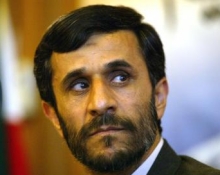
In a curious move, Iranian President Mahmoud Ahmadinejad has called for a cease fire in the conflict in Lebanon between Israel and Hezbollah. Given the belief by many Middle East experts that Iran encouraged the actions that led to the conflict, it seems a bit odd that Iran would feel compelled to comment on the issue. The Associated Press has the full story here.
DUSHANBE, Tajikistan -- Iranian President Mahmoud Ahmadinejad called for a cease-fire in Lebanon and criticized U.S. policy in the Middle East on Wednesday, saying Washington wants to "recarve the map" of the region with Israel's help.
Ahmadinejad's nation is a major backer of Hezbollah and a sworn enemy of Israel, but he denied that Tehran provides military support to the militant group.
He said Iran only supports Hezbollah politically and morally.
Note that he clearly states that Iran's support for Hezbollah does not include weapons or other military support...only "politically and morally". Recent reports from Israel have indicated that some of the missiles fired into Israel by Hezbollah were produced in Iran. While impossible to determine the significance of the statement, one must wonder if the President is concerned that Iran may soon be the target of further actions on the part of Israel or the United States.
Some regional experts have felt that the conflict in Lebanon would ultimately benefit Iran and elevate the country's stature within the Middle East. I've read speculation that Iran may have been seeking leverage with regards to its nuclear program that has been the object of international concern. Additionally, some observers have noted that the absence of a powerful Iraq, which had previously been a counter force to Iran, has allowed Iran to assert greater influence within the region.
Daniel DiRito | July 26, 2006 | 10:55 AM |
link
| Comments (1)


There is growing sentiment and increasing pressure from a number of high profile foreign policy conservatives to reassign Secretary of State Condoleezza Rice to a lower level position within the Bush administration. At the moment the consensus has yet to reach the level that was previously witnessed with the failed nomination of Harriet Miers to the Supreme Court. Nonetheless, if world events continue to further destabilize, some experts believe Rice could be demoted after the midterm elections. Insight on the News has the full story.
Conservative national security allies of President Bush are in revolt against Secretary of State Condoleezza Rice, saying that she is incompetent and has reversed the administration’s national security and foreign policy agenda.
The conservatives, who include Newt Gingrich, Richard Perle and leading current and former members of the Pentagon and National Security Council, have urged the president to transfer Miss Rice out of the State Department and to an advisory role. They said Miss Rice, stemming from her lack of understanding of the Middle East, has misled the president on Iran and the Arab-Israeli conflict.
The criticism of Miss Rice has been intense and comes from a range of Republican loyalists, including current and former aides in the Defense Department and the office of Vice President Dick Cheney. They have warned that Iran has been exploiting Miss Rice's inexperience and incompetence to accelerate its nuclear weapons program. They expect a collapse of her policy over the next few months.
"We are sending signals today that no matter how much you provoke us, no matter how viciously you describe things in public, no matter how many things you're doing with missiles and nuclear weapons, the most you'll get out of us is talk," former House Speaker Newt Gingrich said.
A leading public critic of Miss Rice has been Richard Perle, a former chairman of the Pentagon's Defense Policy Board and regarded as close to Mr. Cheney and Defense Secretary Donald Rumsfeld. Mr. Perle, pointing to the effort by the State Department to undermine the Reagan administration’s policy toward the Soviet Union in the late 1980s, has accused Miss Rice of succumbing to a long-time State Department agenda of meaningless agreements meant to appease enemies of the United States.

Thought Theater has previously discussed the neoconservative origins and their ascendancy to power in the current Bush administration. One of the sources of this prior posting stated the following with regards to Richard Perle:
From Le Monde diplomatica:
Richard Perle, one of the most influential neoconservatives in the current administration and an early critic of detente, is quite open about it: "We had to show that detente could not work and re-establish objectives of victory" (5). Helped by Nixon’s ignominious downfall and the accession of Gerald Ford, who became a weak and unimpressive president, the radical right rapidly consolidated its position.
It clearly appears that the neoconservatives see Rice as an obstacle to the final implementation of their foreign policy doctrine...a doctrine which views power and force as the primary tool for the resolution of conflict. They oppose the notion of detente and have spent the last thirty plus years attempting to position the U.S. as the singular superpower. Rice's close relationship with high level officials in the State Department is seen as a negative that contributes to her perceived ineffectiveness.
One is inclined to wonder if the delay in U.S. efforts to broker a cease fire in the current Middle East conflict between Israel and Hezbollah is an indication of a waning confidence in the direction of the efforts of the Secretary of State as well as some further expanding neoconservative influence with the President. The fact that the administration has indicated that there must be an enduring solution rather than any rapid efforts to negotiate a cease fire seems to support the neoconservative belief that threats must be dealt with from a position of strength...even if that includes a lengthier period of military engagement. The delay in dispatching Rice to the region seems to be significant.
A major problem, critics said, is Miss Rice's ignorance of the Middle East. They said the secretary relies completely on Undersecretary of State Nicholas Burns, who is largely regarded as the architect of U.S. foreign policy. Miss Rice also consults regularly with her supporters on the Senate Foreign Relations Committee, Chairman Richard Lugar and the No. 2 Republican, Sen. Chuck Hagel of Nebraska.
The critics said Miss Rice has adopted the approach of Mr. Burns and the State Department bureaucracy that most—if not all—problems in the Middle East can be eased by applying pressure on Israel. They said even as Hezbollah was raining rockets on Israeli cities and communities, Miss Rice was on the phone nearly every day demanding that the Israeli government of Prime Minister Ehud Olmert exercise restraint.
"Rice attempted to increase pressure on Israel to stand down and to demonstrate restraint," said Stephen Clemons, director of the American Strategy Program at the New America Foundation. "The rumor is that she was told flatly by the prime minister's office to back off."
The critics within the administration expect a backlash against Miss Rice that could lead to her transfer in wake of the congressional elections in 2006. They said by that time even Mr. Bush will recognize the failure of relying solely on diplomacy in the face of Iran's nuclear weapons program.
The direction of U.S. foreign policy appears to hang in the balance as the two sides jockey to influence the President. Should Rice be demoted after the November elections, one might expect to see the administration undertake a new round of military interventions. If the neoconservatives have their way, we may well find ourselves in the midst of a preemptive strike on Iran's nuclear program.
A number of articles have been written in recent months that indicate planning for such an attack has been in progress for some time. The administration has dismissed such speculation by indicating that multiple scenarios are considered with each security risk. There is little doubt that takes place on a routine basis...however it appears that there is growing pressure to transform these hypothetical models into actionable foreign policy positions. The demotion of Rice may signal that eventuality.
Daniel DiRito | July 26, 2006 | 7:10 AM |
link
| Comments (1)



Despite clear evidence to the contrary, a majority of Americans still believe that Sadaam Hussein had strong links to al Qaeda and that U.S. forces found weapons of mass destruction in Iraq. The results point to the success of the Republican Party to craft and deliver messages that are clearly designed to manipulate the beliefs held by the public. It clearly points out that the repetitive delivery of short and consistent messages that either infer facts or omit facts have been a mainstay in the Karl Rove strategy. Read the full article on the latest polling here.
(AXcess News) New York - Despite being widely reported in the mainstream news media that the US and other countries have not found any weapons of mass destruction (WMD) in Iraq, as well as Democrat talking points that Bush lied about WMD, more Americans (50%) think that Iraq had such weapons when the US-led coalition invaded Iraq, according to the latest Harris Poll.
-- Seventy-two percent (72%) believe that the Iraqis are better off now than they were under Saddam Hussein (slightly down from February 2005 when 76 percent said this was true).
-- Just over half (55%) think history will give the US credit for bringing freedom and democracy to Iraq (down substantially from 64% in February 2005).
-- Sixty-four percent (64%) say it is true that Saddam Hussein had strong links to Al Qaeda (the same as 64% in February 2005).
The public's views on Iraq have not changed substantially in the past year.
Not all of the polling reflects success for the Republican messages. The war effort still remains unpopular and the public is skeptical that the United States is safer as a result of the Iraq invasion.
-- A majority (56%) thinks that spending huge sums of money to invade and occupy Iraq has meant that a lot less money has been available to protect the United States against another terrorist attack. This has decreased from April 2005 when 62 percent agreed with this sentiment.
-- Still, six in 10 (61%) adults agree (59% in April 2005) that invading and occupying Iraq has motivated more Islamic terrorists to attack the United States.
-- By 58 to 41 percent, a clear majority does not think that invading Iraq has helped to reduce the threat of another terrorist attack against the United States. This is similar to the 61 to 39 percent majority that felt this way in April 2005
It remains to be seen how this sentiment will translate at the voting booth this November. The mixed results make it difficult to gauge whether voters will hold their elected officials responsible for their misgivings with regard to the President's handling of the Iraq war. The fact that the administration continues to equate the war in Iraq with 9/11 and the war on terror is a troubling indication. The 2004 presidential election seems to indicate that the ability of the administration to maintain that connection proved to be a winning strategy. Whether that will translate into voters supporting Republican candidates may be a key factor in November.
Daniel DiRito | July 25, 2006 | 9:39 AM |
link
| Comments (0)


Update:
The following video is a great follow up to the original posting discussing our Middle East strategy. It is a good discussion between Pat Buchanan, Chris Matthews, and Bob Schrum in which they discuss the neoconservative strategy and whether their hawkish strategy is leading the United States into further conflicts.
____________________________________________________________
Original Posting:
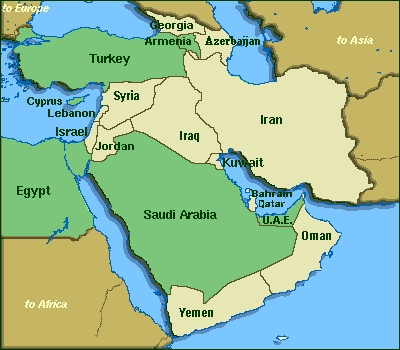
There are many opinions on the recent Israeli assaults on Hamas and Hezbollah in Gaza and Lebanon. The military actions were initiated in response to the killing and abduction of Israeli soldiers. Clearly Israel was provoked and one must question the motivations of those who engineered the abductions. At the same time, some have questioned the depth and degree of the retaliation especially with regard to the assaults within Lebanon. The Nation has an interesting article that discusses the rationale and the ramifications of the current conflict here.
It makes no sense for Israel to destroy the civil infrastructure of the Palestinians and of Lebanon in response to the kidnapping of its soldiers, or to further weaken the capacity of the governments of Lebanon and the Palestinian Authority while at the same trying to hold them accountable for the actions of groups and militias they cannot reasonably control. This collective punishment of the Palestinian and Lebanese people is not only inhumane and should be condemned but also leads to more radicalization and to more chaos.
As I've listened to an array of experts comment on the situation, I found the comments of Pat Buchanan, with whom I normally disagree, to be a reasonable assessment of the situation and an even better analysis of the failure of the Bush administrations efforts within the region. Buchanan, who has been accused of being anti-Semitic, actually has a coherent position worthy of consideration. Buchanan has made the distinction that he is a "traditional conservative" as opposed to a "neoconservative", the term given to many within the Bush administration who frequently support the use of that military intervention.
He has argued that Israel has the right to exist and to defend its security but he also believes that the Middle East would have fewer problems if and when the Palestinians were in fact given an independent state. With regards to the "war on terror" his position can be distinguished from the Bush administration by his belief that terrorists hate America for what we do, not what we are. The Bush administration has chosen to assert that terrorists are opposed to the freedoms that America and democracy represent and support. The distinction is essential to understanding Buchanan's criticism of U.S. foreign policy, whereby he contends our propensity to meddle in the affairs of other nations and regions fosters the negative feelings that have led to the development of an expanding anti-American sentiment.
With regard to the current situation, Buchanan and The Nation agree on a number of points.
The big beneficiaries of American policy have been the more radical wings of Hamas and Hezbollah and the Iranians, who more and more look like the champions of the Palestinian people. The big losers are the so-called moderate Arab regimes, which again look helpless in the face of what is seen as Israeli aggression, and the moderate Israelis, Palestinians and Lebanese who hoped for some normalcy of life with the prospect of peace, especially when the Hamas leadership appeared to be moving toward recognition of Israel. The United States and the larger world, too, are losers, for no one benefits from this mindless escalation of violence, particularly at a time of growing sectarian violence in Iraq and rising oil prices.
The events of the past two weeks should remind us that the peace and stability of the region is too important to be left to Israel and to Washington. There is a need for much greater and more forceful UN and European Union involvement and for the kind of diplomacy that the Europeans and the UN conducted in the late 1980s and the early '90s that led to the mutual release of prisoners and eventually to the Oslo peace process. The UN Quartet--consisting of the UN, the United States, Russia and the EU--has been far too deferential to the Bush Administration's failed road map strategy, and it is time for more active and comprehensive G-8 and UN-led diplomacy.
Until the United States and those who seek to shape the outcome in the Middle East realize that recent efforts have simply served to further radicalize the mindset of the people in the region, there will be increased tensions, violence, and instability. The fact that both Hamas and Hezbollah have been democratically voted into the respective political structures of the Palestinian Authority and Lebanon are clear signs that the current approach has only expanded the anti-Israeli and, by association, anti-American sentiment.
The U.S., in shifting its Middle East strategy since the Bush administration was elected, has lost its standing as an impartial broker of peace and stability within the region. The horrific events of 9/11 should have provided the United States with the moral authority to demand and dictate resolutions within the region. Instead, the neoconservative mentality has served to undermine our ability to bring peace to the region and has led to the further radicalization of its occupants.
Daniel DiRito | July 22, 2006 | 2:53 PM |
link
| Comments (0)


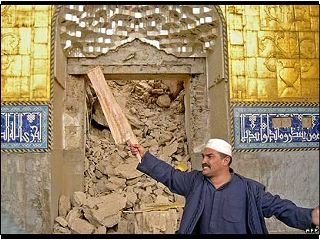
In a move that signals the delay of plans to reduce troop levels in Iraq, the U.S. now plans to move troops from Kuwait into Baghdad. Additionally, it appears that the plan to cancel some deployments to Iraq will not materialize at this time given the escalation of violence. Read the full article from The Associated Press here.
The deteriorating security situation — especially in Baghdad — has alarmed U.S. officials, who had hoped that the new national unity government of Prime Minister Nouri al-Maliki would be able to ease tensions so that the U.S. and its international partners could begin removing troops this year.
But the situation has gotten worse since al-Maliki took office May 20. Security is likely to top the agenda when al-Maliki visits the White House this coming week.
The Baghdad area recorded an average of 34 major bombings and shootings for the week ending July 13, the U.S. military said. That was up 40 percent from the daily average of 24 registered between June 14 and July 13.
Much of the violence was due to sectarian attacks. Months of worsening violence has deepened the distrust between Iraq’s Shiites and Sunnis.
A review of the situation seems to suggest that most of the violence stems from long standing sectarian differences. There should be little surprise at the rising violence in the absence of adequate security and a functional government that provides a degree of authority to each of the various factions.
Clearly the calculations prior to the invasion virtually ignored or wholly discounted the underlying sectarian animosities...despite the fact that Sadaam and the minority Sunni's were reviled by many within the majority Shia population. It remains to be seen if a functional consensus government can be established and maintained. As it now stands, the establishment of a democratically elected government entity has done little to quell the hatred that exists. Reports of government sponsored violence serve to further undermine the current government.
Instead of cutbacks, a senior U.S. defense official said the Pentagon was moving ahead with scheduled deployments to Iraq next month and was moving one battalion to Baghdad from Kuwait, where it was in reserve, U.S. officials said.
The U.S. command had drawn up plans to reduce the number of U.S. combat brigades in Iraq from 14 to 12 by September. But that plan has been shelved for the time being because of the security crisis in the capital.
Daniel DiRito | July 22, 2006 | 8:08 AM |
link
| Comments (0)



While the Bush administration touts the war on terror as "democracy on the march", NATO's commander believes Afghanistan is "close to anarchy". Many have argued that the U.S. shifted efforts and resources to the Iraq invasion before having completed the job in Afghanistan. Thought Theater previously reported on the situation in the troubled country here. Read the full story on the NATO assessment at The Guardian here.
The assumption within Nato countries had been that the environment in Afghanistan after the defeat of the Taliban in 2002 would be benign, Gen Richards said. "That is clearly not the case," he said yesterday. He referred to disputes between tribes crossing the border with Pakistan, and divisions between religious and secular factions cynically manipulated by "anarcho-warlords".
Corrupt local officials were fuelling the problem and Nato's provincial reconstruction teams in Afghanistan were sending out conflicting signals, Gen Richards told a conference at the Royal United Services Institute in London. "The situation is close to anarchy," he said, referring in particular to what he called "the lack of unity between different agencies".
The picture Gen Richards painted yesterday contrasted markedly with optimistic comments by ministers when they agreed earlier this month to send reinforcements to southern Afghanistan at the request of British commanders there. Many of those will be engineers with the task of appealing to Afghan "hearts and minds" by repairing the infrastructure, including irrigation systems.
General Sir Mike Jackson, the head of the British army, said recently: "To physically eradicate [opium poppies] before all the conditions are right seems to me to be counter-productive." The government admits that Helmand province is about to produce a bumper poppy crop and is now probably the biggest single source of heroin in the world. Ministers are concerned about criticism the government will face if planting over the next few months for next year's crop - in an area patrolled by British troops - is not significantly reduced.
Clearly, without added infrastructure and economic assistance, the country will continue to be the largest opium producer in the world. Unfortunately, in the absence of other types of economic development, the population will remain dependent upon the illegal crops as one of the few sources of income. The lack of progress in the absence of a strong security presence has made the country vulnerable to a resurgence of Taliban activity and influence.
Daniel DiRito | July 22, 2006 | 7:36 AM |
link
| Comments (1)


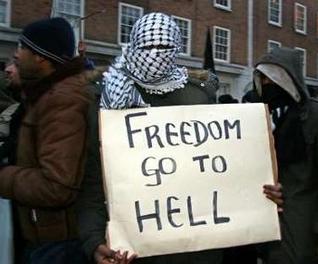
Despite the Bush administration mantra that Democracy is on the march, there is little evidence that anything resembling American democracy is taking hold in Iraq and Afghanistan. In fact, in an indication that Afghanistan may be slipping back towards the extreme Islamic standards that existed under the Taliban, the country is reestablishing the Vice and Virtues Ministry. Read the full article here.
Afghanistan's powerful religious and tribal leaders have been pressing U.S.-backed President Hamid Karzai to reinstate the ministry, which many considered the most powerful in the ousted Taliban government. It employed 32,000 people to enforce the Islamic zealots' bans on girls' schools, on television, on card-playing and other gambling, even on kite-flying and women's public baths.
Karim Rahimi, Karzai's spokesman, said Afghans should not be worried.
"The people were scared of the Vice and Virtues Ministry under the Taliban, but this new ministry won't be like the Taliban's," Rahimi said. "It will take into consideration moral and religious activities to help improve Afghan society."
Misdemeanors deemed fit for punishment of women included wearing socks that were not sufficiently opaque, showing wrists, hands, or ankles, and not being accompanied by a close male relative.
The Taliban's Virtue and Vice squads beat men for trimming their beards or humiliated people found with video recorders by parading them around their neighborhoods with faces blackened with charcoal or oil and with cassette tape wrapped around their head and neck. They forced shopkeepers to close during prayer time.
During the rule of the Taliban, sports fields were converted into execution arenas where those who violated the accepted Islamic laws were routinely put to death in front of civilian audiences. NPR ran a Morning Edition story on the potential return of the much feared ministry. You can listen to the report here.
Clearly the notion that democracy can be exported such that long held beliefs and traditions are readily cast aside is one of the many miscalculations of the Bush administration. In reality, our actions in the region may simply be hardening the resolve of those opposed to any further Western influence.
Daniel DiRito | July 18, 2006 | 6:56 PM |
link
| Comments (0)



The situation in Iraq continues to look bleak. The United Nations reports that some 6,000 civilians were killed in the troubled country in May and June. The report also indicates that some of the sectarian violence has begun targeting specific groups including gays. The Associated Press has the full story here.
From The Associated Press:
Hundreds of teachers, judges, religious leaders and doctors have been targeted for death, and thousands of people have fled, the report said. Evidence suggests militants also have begun to target homosexuals, it said.
According to the report, 2,669 civilians were killed in May and 3,149 were killed in June. Those numbers combined two counts: from the Ministry of Health, which records deaths reported by hospitals; and the Medico-Legal Institute in Baghdad, which tallies the unidentified bodies it receives.
The report charts a month-by-month increase in the number of civilians killed, from 710 in January to 1,129 in April. In the first six months of the year, it said 14,338 people had been killed.
Women report that their rights have been rolled back by extremist Muslim groups _ both Shiite and Sunni. While under Saddam Hussein's largely secular regime, women faced few social restrictions, they say they are now barred from going to market alone, wearing pants or driving cars.
One is left to wonder who is responsible for security within the country. Despite having 130,000 American soldiers on the ground and the Bush administration assertion that Iraq now has some 260,000 of its own soldiers, the violence seems to continue unabated. A telling fact was revealed by General Pace during a hearing when he responded to a member of Congress who pressed him for the actual number of combat ready troops. The answer was reported in a recent article by Newsweek. The full article can be found here.
From Newsweek:
A few weeks ago Gen. Peter Pace, the Chairman of the Joint Chiefs of Staff, provided the real answer. He was asked, pointedly, by a member of Congress, not how many Iraqi forces had been "trained" but how many were capable of sustained, independent operations throughout Iraq today. His answer? None. And it's been three years.
Daniel DiRito | July 18, 2006 | 6:18 PM |
link
| Comments (0)



It was recently reported that the no-bid contract with Halliburton subsidiary Kellogg, Brown, & Root (KBR) to provide a variety of services in Iraq would be cancelled. Since early on in their contract, Halliburton has come under scrutiny for its business and billing practices. Despite the reports in the news about this development, Halliburton will still be able to bid on contracts and more importantly, they get to walk away with a large sum of money they were likely not justified to charge. Margaret Carlson has an excellent article detailing the abuses here at Bloomberg.com.
Two sets of hearings by Representative Henry Waxman and Senator Byron Dorgan, using the Pentagon's own information, exposed Halliburton's deceitful billing practices: charging for twice as many employees as actually hired and always choosing the most expensive vendor. Instead of paying 80 cents a pound for bacon, Halliburton paid $6. Instead of $450,000 for ice, Halliburton paid $3.4 million, blaming transportation costs. Where did it come from, Alaska?
It would be bad enough if this awful behavior claimed no victims, but Halliburton's greed put soldiers already in harm's way at greater risk. Rather than purify the water, KBR ignored regulations so that soldiers bathed and brushed their teeth in water with E. coli bacteria floating in it. Rather than fix new but poorly maintained trucks, KBR abandoned or torched them, leaving soldiers stranded along roads mined with explosive devices, according to an eyewitness at Dorgan's hearings.
Letting Halliburton continue, much less bid on government logistics contracts again, sends a terrible message. It says, If I catch you bilking the government, I'll suggest you knock it off. But I'll still pay you, and require only that you compete for the opportunity to do so again -- and likely win because of experience gained from three years on the job, more information than anyone but the Army itself, and an infrastructure already in place. Halliburton could lose if federal procurement officials took into account ``past performance,'' as required, although their pathetic performance in the past makes this unlikely.
In March, Waxman tried to amend the defense appropriations bill to deny contracts to any firm the Pentagon found billed more than $100 million in unreasonable costs. Republicans blocked it.
While Dick Cheney no longer works for Halliburton, it is hard to imagine that the company's mode of operation is much different from when he led the organization. In all likelihood, many of the methods were probably put in place under his leadership as it would be hard to conclude that the company suddenly reversed its ethical profile. Clearly we can't directly blame Cheney for their actions but we can blame our government for allowing the company to cheat the country out of huge sums of money. For a man focused on dealing with problems through the use of force it seems only appropriate to coin this debacle the "war on integrity". As with all Cheney driven wars, the cost to America is inexcusable.
Daniel DiRito | July 17, 2006 | 9:33 PM |
link
| Comments (0)



The prevailing opinion is that the Middle East is a very complex and complicated region rife with centuries of sectarian, tribal, cultural, and religious differences. I agree with that characterization with regards to attempting to summarize the area historically. As to the current problems that have spiraled into a near full scale regional war, I’m convinced that the solution to the many issues rests solely upon one defining problem…from which all others emanate and from which all others can be resolved. In fact, in what some may call my fanciful Hollywood formulaic prescription, one particular movie quotation seems to capture the essence of my proposed story line…“If you build it, they will come". The “it" is none other than a Palestinian state.
Dissect the situation any way you choose but you will always come back to the need to provide for an autonomous Palestinian state. Should there be any doubt; one need merely follow the underlying sentiment that has led to the formation of the PLO, Hamas, Hezbollah, and numerous other anti-Israeli / pro-Palestinian organizations. Further, if one were to attempt to understand the dynamics at play in Iraq prior to the U.S. invasion as well as the failure of the Iraqi people to view the American troops as liberators (that glorious scenario envisioned by Dick Cheney and his band of neoconservatives who metaphorically run around shooting others in the face with reckless abandon), one must only realize that the United States is seen as an obstacle to freedom in the Middle Eastern mindset.
As with those who doubt Israel will ever allow for a Palestinian state, so too do the Iraqi’s doubt that the United States will ever fully implement an autonomous Iraq. They make that conclusion by extrapolation…one that says if the United States is fully supportive of Israel and Israel has yet to provide for a Palestinian state, then why would the U.S. ever provide for an Iraqi state since they, like the Israeli’s, will always be able to identify the potential for an independent Iraq to threaten the security of the region and ultimately the United States.
Believe it or not, the United States has played kingmaker in the region for decades…arranging for those seen as acceptable or malleable to U.S. interests to gain or retain power…and even to remove them from power at such time as the alliance is no longer strategically satisfying. I don’t offer that observation in order to summarily condemn U.S. actions…some were necessary and prudent…however, they are also open to interpretation by those within the region and others as acts of imperialist intervention solely motivated by the prevailing interests of the United States.
The point is that if “A" plus “B" leads to “C", and even if such calculation is necessary though harsh, one can’t expect those who may be observing to simply ignore the math…we must be realistic that our actions have consequences…even if we deemed our actions advisable.
The neoconservative mindset is such that they expect consequences but they intend to deal with them through power or force. They believe that if we remain the biggest kid on the block, we can dictate to the block. The rationale says that because they hold power, they can dictate reality…and when perceptions don’t match reality, they simply and methodically apply force to achieve the reality they desire. Missing from that analysis is the formula that always evolves once a group of individuals coalesce around the perception that they have a bully in their midst…they realize they cannot confront the bully one on one or directly since they acknowledge they cannot defeat the bully in that manner…so they adopt other tactics. The Middle East is a textbook example of this eventuality.
Also missing from the equation is the benevolence / malevolence consideration. I try to keep my assertions simple so let me offer an example that most people can relate to. In virtually every work environment there is some hierarchy whereby some individuals are established as authorities with the power to affect the lives of those they supervise or manage. It doesn’t take long for those who are subject to the authoritarian figure to determine if that individual is a benevolent supervisor or one they feel operates out of malevolence.
Frequently this supervisory dynamic is acted out without any real reasoned analysis since that person may be the owner of the company or may be so well connected to those within the ownership that malevolent actions can be carried out with little consequence to the person in authority. At the same time, those individuals who answer to the person in authority will likely be negatively impacted (perhaps overworked, mistreated or fired). Often absent from the analysis is the impact such situations have on the morale of the employees and ultimately the success of the company…which has to compete with other similar companies.
We’ve all seen trigger happy employers who believe termination is the preferred tool to resolve problems. However, with each termination, the remaining employees make a determination as to the legitimacy of the termination. Over time, a belief may be created amongst the employee base that those in authority are malevolent and so begins a process to undermine or sabotage the supervisor or the company. As the belief grows, the ability to root out the dissenters becomes more difficult…as one employee is terminated and another arrives, they are frequently greeted with negative information from coworkers about the propensity of those in authority to be malevolent and they are therefore likely won over before ever having the opportunity to make their own objective evaluations.
Over time, the impressions and beliefs held by present and past employees’ travels beyond the confines of the company. Other companies employees may become aware of the malevolence and refuse to apply for work with the negatively identified company or the entire industry may adopt the same beliefs and seek to isolate the company or facilitate its demise.
The bottom line is that the perceptions of people will have impact at some point regardless of one’s proximity to power. Typically, such entities eventually fail because they are unable to maintain the favor of enough individuals to perpetuate the power they hold…whether that be from losing the support of those within or from the actions of those who are operating in the surrounding environment.
Goodwill is not a commodity that can be turned off and on at one’s discretion like a spigot. It is ultimately driven by perceptions and once perceptions have deteriorated, the benevolence needed to reverse the perceptions unfortunately grows disproportionately. Despite notions to the contrary, the masses are for the most part adept at evaluating core sincerity and integrity. Additionally, they are far quicker to attribute actions negatively than they are to give the benefit of the doubt. Unfortunately, they are also reticent to reverse their conclusions once they have been adopted. That’s simply human nature.
I think the example does a reasonable job of describing the dilemma in the Middle East. It is further complicated by the amount of time that the situation has been allowed to fester and the fact that terminations in this theater are actually fatalities. Sadly that has made it vulnerable to succumbing to arguments that are predicated on debating the “chicken or the egg" or “who did what to whom and when"…none of which serve to move the situation towards resolution.
Nonetheless, it is time for tangible actions that can change perceptions. At the same time, this will require acknowledging some unpleasant realities as well as demonstrating untold patience and restraint. What I mean to say is that even if Israel moves forward with the establishment of a Palestinian state, there will be individuals on both sides that seek to undermine the effort and that will remain consumed with hatred and ill-intentions. Those individuals will carry out acts of violence regardless…but they can only be defeated by changing the hearts and minds of those who surround them. The power of perception must become the transforming fuel of persuasion thereby reversing the very process that created and now stokes the current conflict.
Over the course of the last few days, I have read and listened to numerous individuals that have argued that now is the time to proceed to extinguish all those who are identified as Islamic extremists or terrorists in addition to Al Qaeda (sometimes specifically defined as Hamas and Hezbollah…sometimes with Iran and Syria included). Much like the actions of the United States in Iraq and Afghanistan to destroy Al Qaeda, the Taliban and the insurgency, some are calling for similar efforts by Israel and the United States in the rest of the Middle East. Anyone who witnessed 9/11 surely has some appreciation for this sentiment and may well be inclined to support such suggestions.
As I’ve thought about this possibility, I keep coming back to the same prevailing questions…who are these people and how do we identify them if we in fact want to destroy them all? How do we kill them without impacting their friends and relatives who may not fully support them now but may well decide to take up the cause once those they care about have been eliminated? When will we be able to say the job is done and move forward with a plan to provide for a Palestinian state? How do we extinguish the perceptions that are fomenting these individuals and organizations such that they have no further appeal or ability to recruit others?
I also keep coming back to the same answers. We simply cannot succeed in killing all the individuals and organizations that oppose Israel or the United States. We have to eliminate the perceptions that exist and that are being fueled by our further actions. I recall George Bush stating that we would eventually win the war on terror but that it was going to be a long endeavor. Looking back, I’m not sure I understood what he may have been saying and I’m not convinced he did either.
Frankly, today I see the terminology as part of the problem…we simply cannot achieve the peace we seek by prosecuting the kind of war we have chosen. Perhaps we can lessen the chances of another 9/11 but the eventual reality of this type of “war" may well be an existence akin to that of the people of Israel…where the perpetual reality is such that so long as the impetus for the hatred exists we will live with the inevitability that every once in a while a suicide bomber will walk into a busy restaurant and detonate a bomb.
It is time to jump ahead to the core problem. Every effort should be employed to immediately establish an independent Palestinian state. If we were to invest a portion of the funds we anticipate spending in Iraq over the next few years on building a functional Palestinian state we could demonstrate to those who distrust or despise the United States that we understand the underlying regional dynamics that have led to perpetual instability and conflict in the Middle East. It may also provide the backdrop for the resolution of other festering problems within the region.
The risks of such an endeavor are far outweighed by the potential benefits. Further, as the most powerful nation in the world, we would still retain the ability to use force where required. However, we would be doing so after having done the right thing which would elevate our moral standing in the world and have the likelihood to change the perceptions of the people that inhabit the region. We could then act from a position of justifiable strength and integrity.
If we continue down the current path, we may well not be able to sustain the costs in currency and conflict. As the region and perhaps the world stands on the precipice of an escalating period of instability and expanding wars we have very little to lose. If we build a Palestinian state, answers will come.
Daniel DiRito | July 15, 2006 | 5:23 PM |
link
| Comments (9)


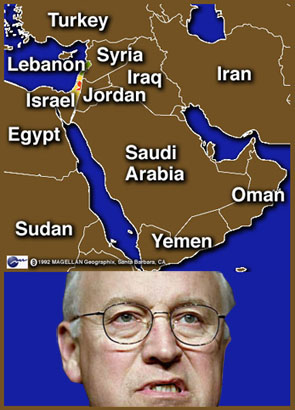
The concept of detente, a feature of the Nixon years under the direction of Henry Kissinger, may be the most viable alternative to the spiraling conflict that now grips the Middle East. Standing clearly in the way of such an effort is none other than Dick Cheney. A little history is necessary to fully understand the underlying philosophical principles as well as the less obvious psychological motivations.
From The Washington Post - September 30, 2001:
Taken together, the current Bush team represents the generation that believes in unrivaled American power -- an America so strong that it has no need to reach accommodations with anyone, neither the Soviet Union or China in the Cold War period, nor Russia or China today. The key players all share some common underlying assumptions about the need for a muscular American role in the world, with an extensive network of alliances that support the United States but do not unduly limit its freedom of action, and with troops deployed around the globe to deter major wars, but not to become ensnarled in extensive peacekeeping duties.
Most of the Bush team became involved in foreign policy in the1970s, in reaction to events -- the U.S. withdrawal from Vietnam and the pursuit of detente with the Soviet Union -- that they viewed as unduly hamstringing America's role in the world. Within the Ford administration, Rumsfeld, first as White House chief of staff and then as defense secretary, emerged as a leading obstacle to Secretary of State Henry Kissinger's policy of detente. Rumsfeld wouldn't support Kissinger's pursuit of arms control with the Soviets. In his recent memoir of the Ford years, Kissinger writes that Rumsfeld 'in effect permitted and indeed encouraged the bureaucratic process [for detente] to run into the sand.' Rumsfeld's sidekick and ally in the Ford administration -- his deputy on the White House staff and, eventually, his successor as chief of staff -- was a rising young Republican named Dick Cheney.
As the first Bush administration took office, the Cold War was easing. For years, American military planning in the Middle East had been directed above all toward defending against a Soviet strike aimed at seizing oil fields in Iran. By 1989, that threat began to seem remote and outdated. The Joint Chiefs of Staff began drafting a new plan that spoke of the importance of defending the United States, Western Europe and East Asia, but made no mention of the Middle East. The proposal aroused Gen. Norman Schwarzkopf, the U.S. military commander responsible for the Persian Gulf, who began lobbying to have the plan rewritten to recognize the strategic importance of the Middle East and its oil resources. As Schwarzkopf described in his memoir, his campaign succeeded because he attracted three key allies in positions of power: Cheney, who was President George H.W. Bush's new defense secretary; Wolfowitz, the new undersecretary for policy; and Powell, then in a top military post.
As one tracks the career of Dick Cheney, it becomes clear that his philosophy is such that detente is antithetical to his vision of an America atop the power pyramid. He and many of those who have been key players in the Bush administration foreign policy strategy have a long history of opposition to detente. The 9/11 attack simply provided the nexus to proceed with the agenda now defined as neoconservatism and the doctrine of preemption. Prior to being defined as neoconservatives, the alliance took the form of a group identified as Team B.
From The Long March of Dick Cheney by Sidney Blumenthal - November 28, 2005:
The origin of Cheney's alliance with the neoconservatives goes back to his instrumental support for Team B. Upon being appointed secretary of defense by the elder Bush, he kept on Wolfowitz as undersecretary. And Wolfowitz kept on his deputy, his former student at the University of Chicago, Scooter Libby. Earlier, Wolfowitz and Libby had written a document expressing suspicion of Soviet leader Mikhail Gorbachev's liberalizing perestroika and warning against making deals with him, a document that President Reagan ignored as he made an arms control agreement and proclaimed that the Cold War was ending.
After the Gulf War victory, in 1992, Cheney approved a new "Defense Planning Guidance" advocating U.S. unilateralism in the post-Cold War, a document whose final draft was written by Libby. Cheney assumed Republican rule for the indefinite future.
The motivation behind the drafting of the DPG centered on the concern that with the fall of the Soviet Union, the defeat of Sadaam Hussein in the Gulf War, and with no apparent superpowers to compete with the U.S., there may be a move towards demilitarization. In order to prevent any such actions and to avoid a return to detente, the DPG was drafted and recommended the following:
From Philip S. Golub in Le Monde diplomatique - March, 2003:
"preventing a hostile power from dominating regions whose resources would allow it to attain great power status, discouraging attempts by the advanced industrial nations to challenge US leadership or upset the established political and economic order, and precluding the emergence of any potential future global competitor" (12).
Golub goes on to explain how 9/11 not only provided for the continuation of the neoconservative philosophy, it allowed for the addition of the doctrine of preemption.
In the aftermath of 11 September, the Bush administration turned the campaign against terrorist networks into a war against the "axis of evil". In so doing, it was simply pursuing a strategic and political policy defined in the 1970s and revised in the early 1990s to meet the needs of the post-cold war era. The doctrine of pre-emptive strikes, officially adopted in September 2002, certainly breaks with the policy of containment and deterrence the US had consistently pursued. But it is in line with the unwavering determination of the radical, nationalist and neo-conservative American right to wage war to establish its authority.
To demonstrate the political acumen of Dick Cheney, I would offer the observations of Franklin Foer and Spencer Ackerman. In an article published in The New Republic in November, 2003 and titled, The Radical, they explain how Cheney sold President Bush on the invasion of Iraq.
From The New Republic article The Radical - November, 2003:
Bush was well aware that several of his senior aides wanted to take the battle to Iraq. When his advisers had convened at Camp David the weekend after the September 11 attacks, Deputy Defense Secretary Paul Wolfowitz argued on three separate occasions that the United States should immediately target Iraq instead of the more difficult Afghanistan. Bush had settled the matter by instructing his chief of staff, Andrew Card, to quiet Wolfowitz--a moment humiliatingly enshrined by Bob Woodward in his book Bush at War. But, in early 2002, Cheney dispensed with the policy arguments for taking down Saddam in favor of a far more personal appeal. He said simply that he had been part of the team that created what he now saw as a flawed policy--leaving Saddam in power at the end of the Gulf war--and now Bush had a chance to correct it.
His plea was enormously successful. "The reason that Cheney was able to sell Bush the policy is that he was able to say, 'I've changed,'" says a senior administration official. "'I used to have the same position as [James] Baker, [Brent] Scowcroft, and your father--and here's why it's wrong.'" By February, observes a since-departed senior National Security Council (NSC) staffer, "my sense was the decision was taken." The next month, Bush interrupted a meeting between national security adviser Condoleezza Rice and three senators to boast, "Fuck Saddam. We're taking him out."
Note how cleverly Cheney chose to approach the younger Bush. Without directly calling into question the decisions of George H. W. Bush with regard to Iraq, he was able to substitute his own mea culpa in order to persuade George W. that it was time to "correct" the prior miscalculation. Thought Theater has previously explored the relationship between Bush 41 and Bush 43, making the point that the younger Bush has often been motivated to avoid the mistakes he perceived were made by his father in order to overcome his own feelings of inadequacy.
From Thought Theater posting George Bush: Shades of Richard Nixon? - May, 2006:
Both men seemed to have closer relationships with their mothers than their fathers and both mothers doted over and frequently defended their sons. Much of what I read about Nixon in sourcing the paper seemed to indicate that his mother had a significant influence in his life. As I compare this to George Bush, it seems to be the same. When President Bush speaks about toughness, he has often referenced his mother. When asked about consulting his father for advice, few can forget his remark that he instead consulted the heavenly father. Similarly, Nixon’s mother is often the parental influence cited when reading about the former president.
While little can be concluded from these observations, one can put forth the argument that George Bush has a tepid relationship with his father…one that was characterized by a son who followed in his fathers footsteps but rarely achieved the same successes. In many ways, I view their relationship as competitive and I suspect that Barbara Bush has often been the arbiter. One is left to wonder what part this dynamic may have played in the motivation and justification to invade Iraq. As with much of psychology, little can be proven. Nonetheless, sometimes when one strings together enough information it can remain inconclusive but it can also be powerfully convincing.
As we witness the expanding instability of the Middle East which now includes the situation in Iraq that must be characterized as some degree of civil war, the ascension of Hamas to power within the Palestinian government structure, the expanding threat posed by Iran's nuclear ambitions, the escalating conflict between Israel, the Palestinians in Gaza, Hezbollah, Lebanon, and Syria, one cannot fail to question the impact of the neoconservatism championed by Dick Cheney and his cohorts for some three decades.
One must also wonder how different the situation in the Middle East might be had 9/11 not provided the trigger needed to fully implement the goals of the neoconservatives. Nonetheless, 9/11 happened and history will have to look back and review the efforts of this group of men to determine their impact on world stability. It is difficult to imagine any significant shift in strategy away from the current doctrines although the events on the ground may have already forced some retreat. Nonetheless, Dick Cheney will likely remain a formidable obstacle to some return to detente. The Boston Globe's James Carroll may have provided the best summary of the Cheney legacy with the following remarks.
From The Boston Globe article "Deconstructing Cheney - November, 2005:
At world-shaping moments across a generation, Cheney reacted with an instinctive, This is war! He helped turn the War on Poverty into a war on the poor. He helped keep the Cold War going longer than it had to, and when it ended (because of initiatives taken by the other side), Cheney refused to believe it. To keep the US war machine up and running, he found a new justification just in time. With Gulf War I, Cheney ignited Osama bin Laden's burning purpose. Responding to 9/11, Cheney fulfilled bin Laden's purpose by joining him in the war-of-civilizations. Iraq, therefore (including the prewar deceit for which Scooter Libby takes the fall), is simply the last link in the chain of disaster which is the public career of Richard Cheney.
Daniel DiRito | July 13, 2006 | 1:57 PM |
link
| Comments (1)


Daniel DiRito | July 13, 2006 | 10:16 AM |
link
| Comments (0)


Bill Clinton appeared this past Friday at the Aspen Ideas Festival. While he covered numerous topics, I took particular notice of his remarks about the upcoming midterm elections and the Iraq strategy of the Democratic Party. The remarks received...
Daniel DiRito | July 11, 2006 | 8:13 PM |
link
| Comments (0)


Daniel DiRito | July 11, 2006 | 2:23 PM |
link
| Comments (0)


In an apparent response to the recent Supreme Court ruling as to the handling of detainees held by the U.S. military, the Pentagon has issued a policy memo in which it acknowledges that those held at locations like Guantanamo...
Daniel DiRito | July 11, 2006 | 8:33 AM |
link
| Comments (0)


In an expected move, the White House has asked a U.S. District Court judge in Detroit to dismiss a lawsuit that challenges the legality of the Bush administration's NSA domestic surveillance program. The government argued that allowing the case...
Daniel DiRito | July 10, 2006 | 4:16 PM |
link
| Comments (0)


On Iraq On Being A Democrat On Party Loyalty Closing Statements...
Daniel DiRito | July 7, 2006 | 9:31 AM |
link
| Comments (0)


Daniel DiRito | July 4, 2006 | 3:17 PM |
link
| Comments (0)



![]()
![]()













